
All categories
Featured selections
Trade Assurance
Buyer Central
Help Center
Get the app
Become a supplier

(30205 products available)




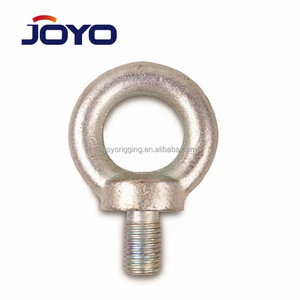
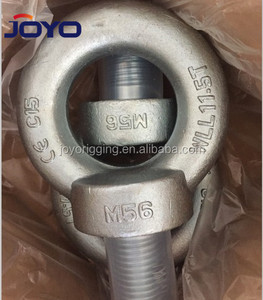



























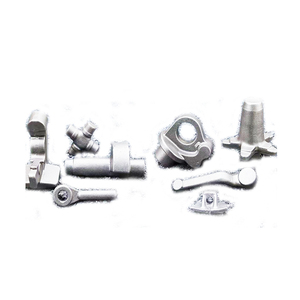

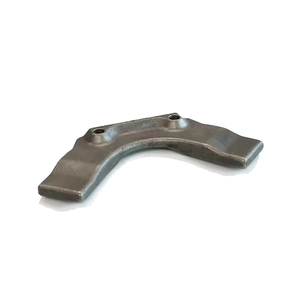




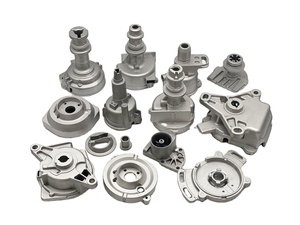
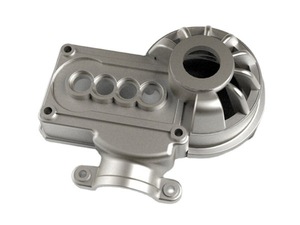


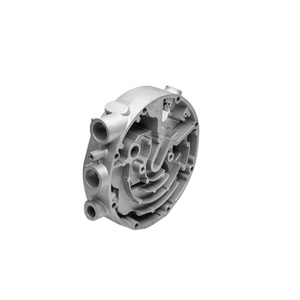
A forges factory china manufacturer uses an array of materials to create distinct forged products. The materials used in the manufacturing of these products are varied, and they include the following:
Steel remains one of the most popular materials used by steel forging manufacturers in the making of forged items because of its strength, longevity, and malleability. In most cases, they heat and hammer such items into shape, and this helps in enhancing steel's grain structure, thus making it stronger in the areas that are subjected to stress. Normally, steel forgings find applications in the automotive industry, structural components, and machinery.
Aluminum, on the other hand, is a lightweight metal that a forging factory mainly uses in making items for the aerospace and automotive industries. Note that it has corrosion-resistant properties and is easily shaped when heated. While its plasticity characteristics are not as strong as those of steel, forged aluminum carries enhanced strength compared to its cast counterpart. Commonly, these forgings are used in making structural components, wheels, and aircraft parts.
Copper alloys, including brass and bronze, are usually forged in this forging workshop. These materials have excellent electrical and thermal conductivity properties. Also, copper alloys are highly resistant to corrosion. Besides, brass, which contains both copper and zinc, is used in making fittings and valves, while bronze, made of copper and tin, is applied in bearings, bushings, and marine hardware.
Titanium is a precious, yet forgeable metal that is often used by a China titanium forging factory. The metal is ideal for its high strength-to-weight ratio and exceptional resistance to both heat and corrosion. This makes it a popular material in the aerospace, medical, and chemical processing industries. Note that titanium forgings are utilized in making aircraft components, surgical instruments, and devices used in plant chemicals.
Carbon steel forges, as well as alloy steel forges, especially cables and rods, use a variety of steel grades depending on the application. Conventional practices among steel manufacturers involve adding carbon or alloying elements such as chromium, nickel, or vanadium to enhance specific traits. Commonly, these forgings find use in highly stressed applications, including heavy machinery, oil and gas exploration equipment, and structural components. Carbon content increases hardness, while alloying elements improve toughness, making these materials suitable for hostile environments.
Forged products have a range of uses, and they include the following:
One of the most important benefits of forged products is their increased strength. Note that the forging process aligns the metal's grain structure in the direction of the imposed stress. This usually results in a product that is far superior to cast or machined components in terms of load-bearing capacity. In addition, these grains promote a stronger bond between the metal's molecules, which enhances the material's overall toughness.
Moreover, durability is an important benefit that comes with forged products. Usually, because of the intense pressure applied during forging, many internal voids and air bubbles are formed in the metal. This noticeably makes forged items more resistant to fatigue and wear over time. In addition, this durability ensures that forged components can face extreme conditions such as heavy loads, vibrations, and constantly changing temperatures without easily failing.
Internal composition and external dimensions of forged items are more consistent compared to their non-forged counterparts. Usually, this uniformity comes about because of the nature of the forging process. Also, it helps in enhancing the internal structure's alignment and ensuring that the external features meet tight tolerance standards. This consistency will go a long way in making sure that the component's performance remains reliable across multiple units. Thus, reducing variations during manufacturing results in a more predictable product that can fit seamlessly into assemblies.
Note that forging often enables the creation of lighter components without significantly reducing their strength. Moreso, in applications such as aerospace and automotive industries, where every bit of weight counts, this is a highly regarded feature. In addition, by strategically shaping forged parts to optimize strength in the required areas, it is possible to minimize material usage while ensuring that the item can effectively withstand applicable mechanical stresses.
Often, forging products exhibit better resistance to environmental factors such as corrosion and heat. Normally, this is achieved through the selection of appropriate alloys and the refinement of the metal's surface during forging. Additionally, these products are ideal for use in extreme environments, including chemical processing plants and oil rigs, where corrosion and thermal degradation significantly impact component longevity.
The properties of forged products such as shape, size, and specific material characteristics are usually tailored to a certain application. Besides, forging factories offer anodizing and machining services that help in achieving the desired surface finish and dimensional accuracy. This flexibility significantly allows manufacturers to develop components that are suited for particular performance requirements in their industries.
Forging products are used in the heavy-duty industry. This industry involves the production of items such as crankshafts, connecting rods, and flywheels for commercial vehicles, industrial engines, and marine propulsion systems. The demanding applications that these items are subjected to require superior strength and durability attributes that only forged items can provide.
In this industry, forged items are used in critical safety applications. Examples of these items are landing gear, turbine wheels, and structural frames. The strength-to-weight ratio and fatigue resistance of these items make them indispensable in the production of aircraft, rockets, and satellites.
Usually, forged items in this sector are used to manufacture components such as turbine rotors, generator shafts, and drilling equipment. In most cases, these items operate under extreme pressures and temperatures. Therefore, durability and integrity that come with a forging workshop in the face of such conditions ensure reliable long-term performance.
These industries heavily rely on forged items for their armor, missile systems, and military vehicles. Ideally, the reliability and strength of such components under extreme conditions are life-saving in defense applications. Thus, making forged items essential in military equipment.
China forging factories use forged tools and dies to manufacture. Some of these tools include cutting, stamping, and molding equipment. In most cases, the wear resistance and hardness of these items translate to better precision and longevity during repetitive manufacturing processes.
Forging also produces surgical instruments and implants. Note that these items require superior material properties in terms of biocompatibility, strength, and resistance to sterilization processes. Moreover, quality and safety standards in this industry are extremely high. This calls for reliance on forged items that have consistent quality and mechanical performance attributes.
Customization options for forged items are many. Some of them are material selection, tooling, surface treatment, and heat treatment.
Usually, forging products manufacturers offer a wide range of materials to cater to the various requirements of their customers. In most cases, they include different types of steel grades, aluminum alloys, copper, titanium, and nickel-based alloys. Ideally, each material comes with unique mechanical properties that make it suitable for a specific application. Therefore, customers can select the material that best meets the operational requirements of their customers.
The forging tools as well as dies play a critical role in determining the shape and structure of the final product. In most cases, manufacturers create custom dies and molds to produce specific designs requested by their customers. Normally, this process involves working closely with customers to ensure that the tooling designs precisely meet their required specifications. Usually, this collaboration enables the production of complex shapes that standard tooling cannot create.
Often, surface treatments are vital for enhancing the appearance and performance of forged items. Besides, China forging factories have various surface treatment options like anodizing, plating, and heat treatment. These options improve corrosion resistance, surface durability, and wear, as well as increasing aesthetic appeal. Normally, customizing the surface treatment allows customers to acquire products that fit their functional and visual requirements well.
Ideally, heat treatment is a prominent process that helps in altering the internal structure of metals. In addition, it enhances their hardness, strength, and elasticity. This comes in handy, especially when forging items for high-stress applications. Usually, manufacturers offer tailored heat treatment processes like quenching, tempering, and annealing to achieve specific mechanical properties that a customer requires. Normally, by adjusting these treatments, customers can ensure that their items withstand the demanding conditions they will likely experience during use.
Finishing options like polishing, coating, and blasting play a critical role in determining the final appearance and surface quality of a forged item. Also, these options significantly enhance the item’s resistance to corrosion and wear. Hence, forging factories provide a variety of customized finishing services that enable customers to efficiently meet their aesthetic and functional requirements.
When choosing a forging factory in China, business owners should consider the following factors:
To know the quality of products that forging manufacturers make, buyers should check the certifications they have. Such certifications will show the manufacturers' capability to make quality forging hardware products. They should also check the materials that manufacturers use to make these products. Manufacturers' making products using quality materials offer quality products. Also, business owners can get worthwhile quality information by reading the reviews and testimonials of the manufacturers.
Business owners should get information on the type of technology forging manufacturers use. In particular, they should look for manufacturers who use advanced technology and equipment. Advanced technology manufacturers will utilize various forging methods to make various products. Such manufacturers will offer a diversified product range that the customers can select from.
Buyers should choose manufacturers based on the type of metal forged products they have. Depending on the stock they intend to sell, they should get manufacturers who make either customized or standard products. In cases when business owners intend to sell unique products, they can stock up customized products.
Business owners should work with manufacturers who can provide them with the products fast. They should get the lead time information so that as they place orders, they are sure of receiving them on time. In cases when they will need the products urgently or intend to do a drop shipment business, they should get manufacturers who have efficient lead times.
Business owners will be working with forging manufacturers directly. Therefore, they should know the prices of products during their wholesale business. They should get price quotations from various manufacturers. In particular, they should get the prices of additional services, such as packaging. Also, they should consider the shipping prices, as they will affect the entire product's prices. Depending on the data they gather, business owners can negotiate for better deals.
To ensure smooth operations and planning, business owners should work with manufacturers who can easily communicate with them. They should get manufacturers who will provide them with the necessary information as they place orders.
After selecting forging manufacturers, business owners should get information concerning the shipping services they will apply. Good manufacturers have a variety of arrangements they will offer. In particular, they will have both air and sea transportation services. Also, they will have different insurance services for the stock.
There are many benefits to choosing a forging factory in China. One of the key benefits is affordability. Chinese manufacturers use advanced technologies, which enable them to have reduced labor costs. They also bulk materials purchases, which help to lower operational costs further.
Both steel and aluminum forged materials are popular in China. They are often used to make auto parts, construction tools, and farm equipment. Business owners can also find titanium forgings, which are often used in the medical and aerospace industries. So, depending on the customers' needs, they can select either metal forged materials.
Chinese manufacturers use various forging methods. But most of them often use open-die forging to make large and impactful metal items like aircraft parts. They also use closed-die forging, especially when making customized items in bulk.
There are various finishing options that enhance forged hardware products. For instance, anodizing improves aluminum products, while sandblasting and coating enhance a product's aesthetics and durability. Therefore, buyers should carefully select these options based on their customers' preferences and needs.